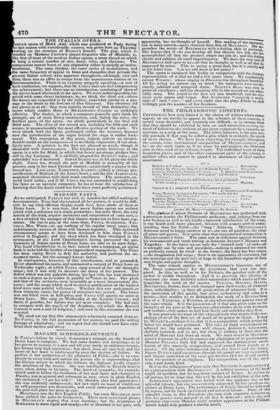THE PHILHARMONIC CONCERTS. CONSIDERING how very limited is the choice
of writers whose names appear, or are worthy to appear in the schemes of these concerts, it would seem desirable, and certainly not difficult, so to arrange them that they should be exhibited in turn on each successive evening, in- stead of following the siufonia of any given composer by a concerto, an overture, or asong of the same. Th
i e latter, however, is the plan usu- ally pursued, f that may be called a plan which is evidently the result of mere chance. We have been expecting, for example, throughout the season, some instrumental composition of MENDELSSOHN'S; and
! on the sixth night, as if to atone for past neglect, the Directors give us two, each of no ordinary length. The individual merit of these respective pieces, and of the other component parts of the scheme, is another affair, and cannot be pleaded in abatement of their careless assortment.
ACT I.11mm
sin lir:F. fania, in c minor
Cantata, Mr Pliti.I.Tps, Napoleon's IMidnight Review N E V I:0N 51. eutice,10, Pianuluite, Madame 1 ) K . . F. 1E NDE f SSOHN • IIA RTROLDT.
Scetta, iss CLARA NOVELL°, " Dell inttlale " SIIITUki0 el () CIMAROSA. ' Abram)
Introduction suit Fugue for fall Orchestra ; never performed in this country
ACT II. MOZART.
sinronia in A; composed for the Philharmonic Society
F. M ENDELSSOHN•BARTI1011.14.
Scena, Madame FcitumnFrt.DEvatENT," Wie nahte tuir tier Schlummer " Der Prieseh;;tz) W ELT R.
Fantasia, Horn, Signor Pozzr COSTA.
Tersetto, Madame SCITHMOSH-DEVRIKNT, Mks CLARA No- 1.1
vst.t.o, and Mr. Pult.t.tes,"Coraggio" (F./dello) 13mrovstr.
Overture, Olicroa WEBER.
Leader, Mr. Molt [—Conductor, Mr. POTTER.
The glorious C minor Sinfonia of BEETHOVEN %YRS performed with a precision worthy the Philharmonic orchestra ; and, judging from our own feelings as well as the loudly-expressed satisfaction of the room, it was heard with more pleasure, because with a more perfect under- standing, than his Ninth —the " long " Sinfonia. MENDELSSOHN'S Sinfonia stood in happy contrast to it—the one all grandeur, the other all grace and gayety. Jt is quite clear that instrumental composition is MENDELSSOHN'S forte. The same sort or difference appears between his instrumental aud vocal writing as between JONSON'S Masques and Tragedies. In the latter we see only the "learned sock" of each—all is wrought out by rule and precedent—nothing is admitted for which an authority cannot be cited : in the former, the fancy has free course —the imagination full scope ; there is no appearance of constraint, but the musician and the poet rove at large in the boundless region of their own bright and joyous thoughts.
The same remark applies to MENDELSSOHN'S Concerto, one of the finest compositions for the pianoforte that ever was ima- gined. In this, as well as in his Sinfonia, the peculiar style of the author is visible throughout. And it is precisely this identity of character (by some foolishly called mannerism) which marks and dis- tinguishes the work of the master. PuncEt.i., HANDEL, HAYDN, BEETHOVEN, Smile, have each stamped upon their works, of whatever class, individuality ; as have all great artists of whatever kind. It is the possession of this quality that gives authenticity and value to a picture—that enables us to distinguish the work of a RUBENS from that of a VANDYKE, a TENTERS, or any other eminent painter even of the same school. It is the possession of it that also gives value to the thoughts of the poet or the musician—that clothes them with freshness and verdure—that makes us feel how freely and unbidden they flow. It was precisely the want of this characteristic that deprived the con- cluding piece of the first act of much of its power to charm. It may be AlozAufs—perhaps it is—but it is a composition which genius far below his might have produced. The rules of fugal counterpoint are adhered to; the subjects are well chosen, dextrou•ly interwoven, skilfully inverted, and so on ; but there is nothing to show that the mind of MOZART had been at work. We must revert to Mrseests- sou NI'S Concerto in order to express our admiration of' its performance. Madame HULCE E N both felt and expressed the characteristic excel- lences of this masterly composition, and carlied fresh laurels as a pianist. Of the other instrumental piece, the less is said the better. Signor Pezzi's rapid excursions through the gamut are very wonderful, and impart somewhat of the same gratification that we should receive from the gambols of an elephant. The composition was of the most vulgar and trashy kind.
Is it in the indulgence of pure spite that NEUKOMM is again subjected to a juxtaposition with BEETitovi:N ? A solitary instance of the kind might be accident, but its repetition savours of design.. Jim justice to all parties, let us hope that this will be the lust exhibition of the sort. SCHTUEDER'S appearance was hailed with the applause due to her
splendid talents, but she was evidently exhausted by her previous ex- ertions at Drury Lane. The performance of Fidelio should be followed by repose, not by fresh excitement and renewed labour: Parts of the splendid seems in Der Frieschatz she sung with exquisite tenderness, but her powers were unequal to all that it demands: and as she will probably play every Monday night, another appearance at the Philhar- monic would only produce a similar result.


























 Previous page
Previous page